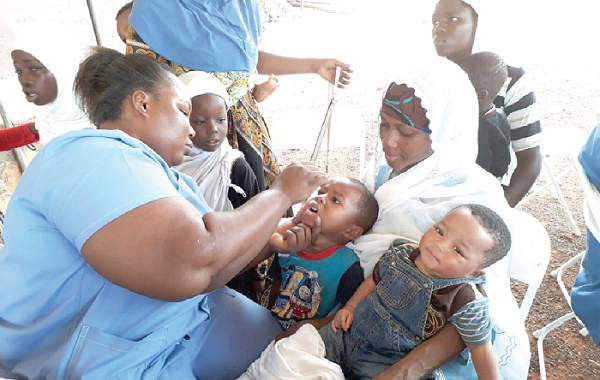
‘Ghana polio eradication exercise yields positive results’
Ghana is close to eradicating poliomyelitis which kills or cripples children for life.
According to health experts, the country’s polio eradication interventions, including periodic nationwide polio immunisation and active surveillance activities, have yielded positive results.
The Country Director of Millennium Promise, Mr Nathaniel Ebo Nsarko, has, therefore, made a passionate appeal to chiefs and community leaders to encourage mothers to immunise their babies to prevent the erosion of the success story of eradicating polio.
He explained that although Ghana had broken the transmission of wild polio virus importation in the country since November 2008, the country was still threatened by the fact that Nigeria had reported cases and that the only way to prevent the relapse was for all newborns to be immunised.
Mr Nsarko was addressing a durbar organised as part of the National Polio Day organised by the Ghana National Polioplus of Rotary International, in collaboration with Millennium Promise, the Ghana Health Service and the National Youth Employment at Aboabo in the Asokore Mampong Municipality of the Ashanti Region.
Millennium Promise is an international non-governmental organisation (NGO) solely committed to accelerating the achievements of the Sustainable Development Goals and the eradication of extreme poverty, hunger and preventable diseases. It is implementing the One Million Community Health Workers (1MCHW) project.
Mr Nsarko noted that latest figures from the World Health Organisation (WHO) indicated that polio cases across the world had been reduced by 99 per cent, with the drawback cases coming from Afghanistan, Pakistan and Nigeria, and that this was not only a threat to neighbouring countries, but Ghana as well.
Coverage
In an interview with the Daily Graphic, Mr Nsarko explained that a recent research by the municipal assembly and the Millennium Promise in the Asokore Mampong Municipality indicated that while the national polio immunisation coverage in Ghana was 90 per cent; the municipality had 70 per cent coverage, attributing it to the fact that some mothers did not avail themselves of the immunisation opportunity.
He explained that the information was gathered by the community health workers who were mobilised and provided with mobile technology by Millennium Promise under its 1MCHW project and paid by the National Youth Employment.
He said the Millennium Challenge project, under the 1MCHW project, was being undertaken at Asokore Mampong because although the municipality had a population of over 360,000, unfortunately, it had no hospital to cater for the health needs of the people and to gather health information.
Appeal
Mr Nsarko, therefore, appealed to the government to consider establishing a district hospital in the densely populated area which also was home to the largest number of head porters in the country who for lack of healthcare delivery, resorted to all forms of unacceptable means of medical attention.
The Chief Executive of the Asokore Mampong Municipality, Alhaji Alidu Seidu, reiterated that although the municipality was the second biggest after the Kumasi Metropolitan Assembly, it did not have a municipal hospital.
